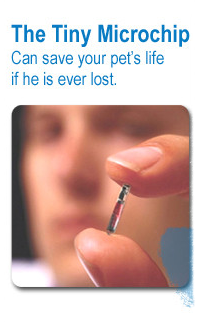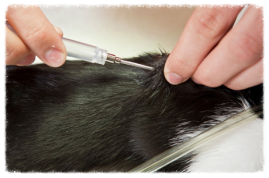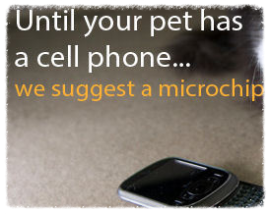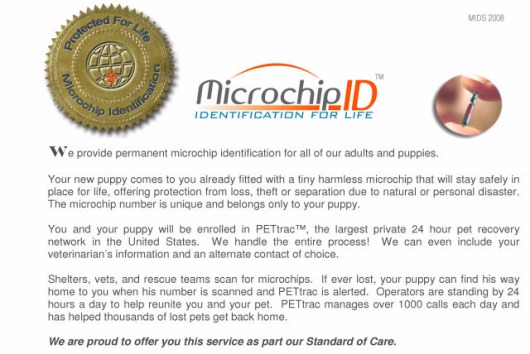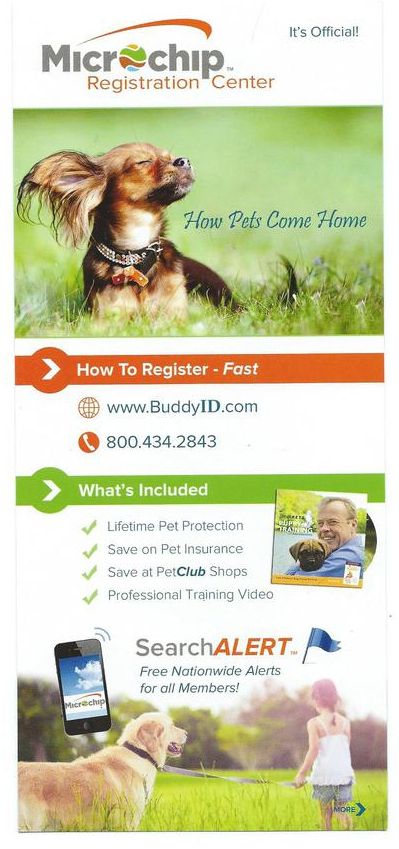HOW SAD AND SCARY WOULD IT BE TO HAVE YOUR BELOVED PET COME UP MISSING AND NIGHT AFTER NIGHT GOES BY AND YOU DON'T KNOW WHERE THEY ARE? WE TRY TO TAKE SOME OF THE WORRY OUT OF THIS HAPPENING TO YOU BY CHIPPING ALL OF OUR PUPPIES BEFORE THEY GO HOME WITH YOU. YOU WILL HAVE THE REGISTRATION CARD IN YOUR HAND AND WILL MAKE CERTAIN YOU ARE REGISTERING THE CORRECT PUPPY BY SCANNING THE PUPPY AND MAKING CERTAIN THAT THE PUPPY MATCHES THE REGISTRATION CARD. IN FACT IT WOULD BE BEST IF THIS IS DONE BEFORE YOU EVEN LEAVE WITH YOUR PUPPY, ITS FAST AND REASSURING THAT YOUR BELOVED PUPPY IS PROTECTED SHOULD THEY COME UP MISSING. ANY PET PROFESSIONAL OR GOD FORBID ANIMAL SHELTER WILL BE ABLE TO SCAN YOUR PET AND CONTACT YOU THROUGH THE REGISTRY AND YOU WILL BE ALERTED WHERE YOUR PET IS. THIS IS AN ADDED VALUE WE PROVIDE IN YOUR ADOPTION FEE.
IT'S SOMETHING THAT WE DON'T THINK ABOUT TOO MUCH WHEN OUR DOG IS WITHIN OUR SIGHT, BUT THE MOMENT THAT HE STROLLS THROUGH AN OVERLOOOKED OPEN DOOR WE THINK, ''IS HE WEARING HIS IDENTIFCATION?'' HOPEFULLY, IF HE IS GONE WITHOUT HIS COLLAR, HE HAS A CHIP. CHIPPING IS THE PROCESS IN WHICH AN IDENTIFICATION MICROCHIP IS SLIPPED UNDER THE SKIN, ASSIGNING AN ID NUMBER TO THE PET, WHICH IS CONNECTED TO THE OWNER [S] CONTACT INFORMATION IN A NATIONAL DATABASE. IT IS SAFE, SIMPLE, INEXPENSIVE AND PERMANENT WAY TO PROTECT YOUR PET AGAINEST LOST OR THEFT. MANY, MANY PEOPLE HAVE CHIPPED THEIR DOGS. IT'S SAFE AND EXTREMELY EFFECTIVE IN FINDING LOST PETS.
TO ACTIVATE BY PHONE : (800) 434-2843
IF I GET LOST I'M MICROCHIPPED : LOST PETS WITH MICROCHIPS ARE 20 TIMES MORE LIKELY TO RETURN HOME.
What to Know About Microchipping Your Pet
What Is a Microchip?
A microchip is a rice-size, nonreactive computer chip that has been programmed with a unique identification number. The chip is injected under your pet’s skin and serves as a permanent form of identification. Veterinarians and animal shelter workers who recover lost pets routinely check for these microchips through the use of scanners that read and display the pet’s microchip number.
Why Should I Microchip My Pet?
A microchip is a permanent form of identification that, unlike tags and collars, cannot be removed, lost, broken or stolen. Veterinarians and shelter personnel routinely scan lost dogs and cats for microchips. Therefore, the chances of being reunited with a lost microchipped pet are high. This becomes extremely important in the case of injured or sick pets who require owner authorization to perform procedures that extend beyond emergency stabilization.
Although it’s unpleasant to think about, microchips are also vital in the recovery of stolen pets. Ownership disputes are immediately settled when a microchip is discovered. Many veterinarians are alerted to lost or possibly stolen animals through fliers. So if an individual walks in with a found pet that matches the flier’s description, the veterinarian will likely scan for a microchip and take appropriate action.
When vets recommend a microchip to pet owners, they often say: “Well, my pet never leaves the yard!” or “My pet stays strictly indoors!” But owners of both indoor and outdoor pets should take advantage of microchipping, because invariably, even under the most diligent watch, pets get out of yards and houses. All it takes is an accidentally unlatched gate, a hole in the fence or the opening of a front door for a pet to make a quick getaway. And that’s not to mention other nightmares that could separate you from your pet — likenatural disasters.
Who Inserts the Chip?
At our veterinary practice, the doctor or a veterinary technician will insert the chip via a hypodermic needle under the skin between an animal’s shoulder blades. (Properly inserted chips rarely migrate out of that specific area.) Our puppies are microchipped at age nine weeks of age.
Will a Microchip Hurt My Dog?
Inserting a microchip may cause slightly more discomfort than a routine vaccination, because the needle has a wider diameter to accommodate the microchip. We like to use the mini chip - less discomfort for the puppy.
What Happens If My Pet and I Move?
Simply contact the microchip company to update your new contact information. Remember, a microchip is useless without being linked to the most current information.
It’s disheartening that most lost animals coming through veterinary clinics and animal shelters aren’t chipped. It’s always a relief to hear that magical beep and see an ID number on the scanner. This means that an owner is only a phone call away. And if every pet owner had this simple procedure done for his or her pet, there would be thousands more happy endings.




